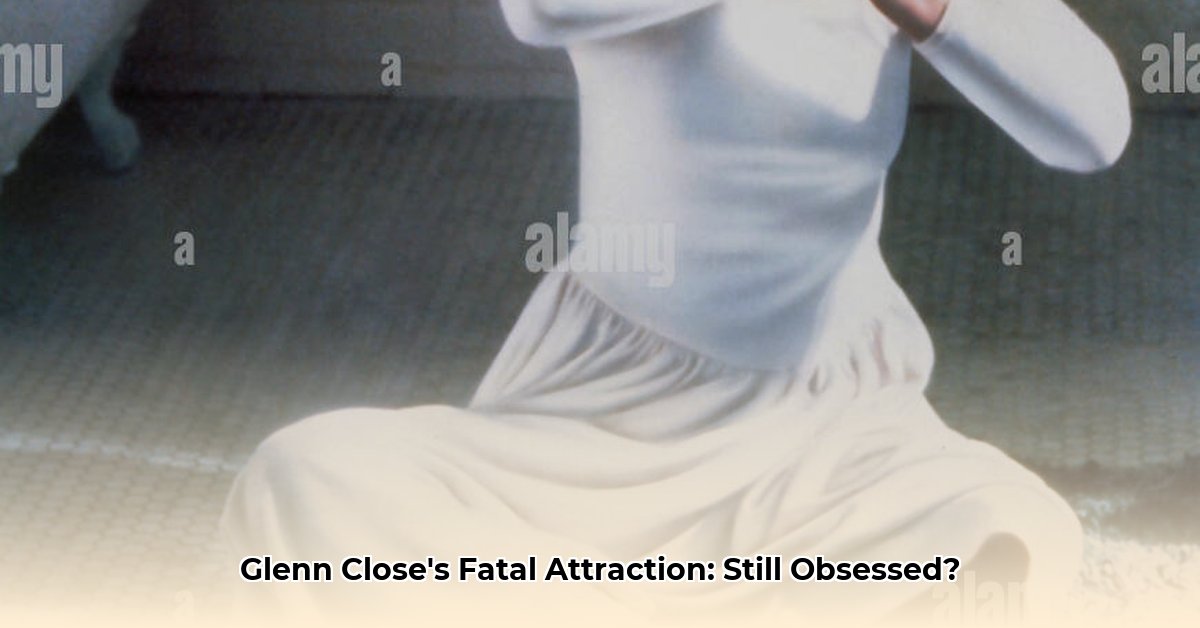The Allure and Anxiety of Alex Forrest
Glenn Close wasn’t pleased with the ending of Fatal Attraction. And she wasn’t quiet about it. The 1987 thriller became a cultural earthquake, and Close’s Alex Forrest, the scorned lover, remains the archetype of the obsessive ex. This deep dive explores Close’s iconic, controversial role, from her pre-Fatal Attraction career to the behind-the-scenes drama, including her improvisation in the infamous sink scene. We’ll dissect the ending that sparked Close’s ire and analyze how the film—for better or worse—influenced the portrayal of women in cinema.
From Garp to Gallagher: Close’s Transformation
Before Fatal Attraction, Glenn Close exuded a quiet strength on screen. Whether as Jenny Fields, the stoic feminist in The World According to Garp, or Sarah Cooper, grappling with grief in The Big Chill, Close embodied a nuanced complexity. Fatal Attraction, however, was a metamorphosis. It ignited a sensuality that audiences hadn’t previously associated with her, transforming her into a symbol of female desire, albeit a twisted and dangerous one. Did Hollywood truly overlook her allure before, or did Fatal Attraction simply unlock a new dimension of her talent?
Becoming Alex: A Study in Obsession
Close’s preparation for Alex Forrest was a masterclass in method acting. She consulted psychiatrists, delving into the labyrinthine psychology of obsession and exploring the potential motivations behind Alex’s unraveling. This wasn’t just line memorization; it was a deep immersion into the character’s psyche. This suggests that Close was acutely aware of the nuances within Alex, making her portrayal even more terrifyingly realistic.
The Sink Scene: A Moment of Improvised Terror
The sink scene, with its chillingly mundane setting and escalating tension, remains a cinematic landmark. Remarkably, much of it was improvised. Close and Michael Douglas, already locked in a volatile on-screen dynamic, allowed the scene to organically combust, fueling the raw emotion. The result is a stark, unforgettable portrayal of obsession’s destructive power. It leaves the viewer wondering what other seemingly spontaneous moments in the film might reveal further depths of Close’s understanding of Alex.
Two Endings: A Clash of Visions
The story of Fatal Attraction‘s ending is a drama in itself. The original, mirroring the tragic fate of Madame Butterfly, saw Alex taking her own life, framing Dan for her murder. Close championed this ending, believing it resonated with Alex’s character arc. Test audiences, however, craved a more conventional resolution. The studio, prioritizing box office success, demanded a rewrite. The resulting theatrical ending, with Beth killing Alex, provided a clear-cut victory for the Gallagher family but arguably sacrificed the psychological complexity of Close’s original interpretation.
The “Bunny Boiler” Legacy: A Complex Conversation
Fatal Attraction ignited a cultural firestorm. The term “bunny boiler” became ingrained in the lexicon, a shorthand for female rage and obsession. But did this portrayal perpetuate damaging stereotypes? Did it unfairly reduce a complex character to a caricature of female instability? These questions continue to be debated, particularly in light of evolving understandings of mental health. The very term “bunny boiler” arguably trivializes the profound mental distress that likely fueled Alex’s actions. What responsibility do filmmakers have when portraying characters grappling with these complex issues?
Close’s Reflections: A Retrospective Lens
Looking back, Close acknowledges the irony of a role intended to showcase her sensuality becoming associated with something so disturbing. She has expressed unease with the film’s darker themes and their potential to perpetuate harmful stereotypes. Her reflections invite us to revisit the film with a contemporary lens, considering how evolving perspectives on mental health might reshape our interpretation of Alex Forrest.
Fatal Attraction‘s Enduring Impact
Fatal Attraction remains a cultural touchstone, a film that continues to fascinate and provoke. Glenn Close’s performance, though controversial, cemented her status as a fearless actress willing to explore the darkest corners of the human psyche. The film’s legacy is complex and multifaceted, raising questions about gender dynamics, mental health, and the delicate balance between artistic vision and commercial pressures. The 2023 Fatal Attraction series, starring Lizzy Caplan, offers a re-examination of the story, further enriching the ongoing conversation about obsession, betrayal, and the enduring power of complex characters. It allows for a comparison of interpretations, prompting questions such as: Does Caplan’s portrayal reinforce or challenge the “bunny boiler” trope? How does the updated narrative, with its increased focus on mental health, affect our understanding of the original film and Close’s performance? The discussion continues, ensuring that Fatal Attraction, and its central character, remain firmly embedded in our cultural consciousness.
| Aspect | Impact |
|---|---|
| “Bunny Boiler” Trope | Became a cultural shorthand for obsessive female behavior, raising questions about the portrayal of female anger and mental instability. |
| Portrayal of Women | Sparked debate on the representation of female characters, particularly regarding sexuality and mental health. Did the film reflect or reinforce societal anxieties? |
| Close’s Career | Solidified her status as a versatile and powerful actress capable of embodying complex and challenging roles. Opened doors for more diverse and nuanced characters. |
| Mental Health | Prompted discussions about the portrayal of mental illness in film. The 2023 series offers a contemporary perspective on mental health, inviting comparisons with the original film’s portrayal of Alex. |
The table above illustrates the multifaceted impact of Fatal Attraction, suggesting that its exploration of these themes continues to resonate with contemporary audiences. The film’s legacy remains a complex and evolving one, encouraging ongoing dialogue and prompting a deeper consideration of its themes within a modern context.







